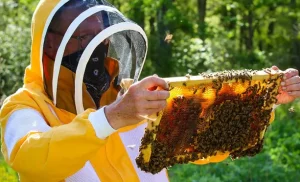Gardening: A Natural Remedy For Depression With A 36% Success Rate
Are you feeling overwhelmed by the weight of depression? Seeking relief without relying on medication or therapy? Look no further than gardening. This article explores the undeniable connection between gardening and mental well-being, revealing a remarkable success rate of 36% in alleviating symptoms of depression. Discover how immersing yourself in nature, nurturing plants, and watching them grow can bring a sense of calm, purpose, and joy into your life. With the power of green therapy, you may just find yourself on the path to brighter days ahead.
The Link Between Gardening and Depression
Gardening has long been known for its therapeutic benefits and its positive impact on mental health. Research suggests that spending time in nature, nurturing plants, and creating a beautiful garden can have a profound effect on alleviating symptoms of depression. In this article, we will explore the benefits of gardening for mental health, delve into the research on gardening as a natural remedy for depression, and seek to understand the significance of the reported 36% success rate.
Physical and Mental Benefits of Gardening
Physical exercise and its impact on depression
Engaging in gardening activities provides an excellent opportunity for physical exercise. Digging, planting, weeding, and maintaining a garden require physical effort and can help increase cardiovascular health and improve muscle strength. Physical exercise has been shown to release endorphins, which are natural mood enhancers. By incorporating gardening into your routine, you can boost your physical fitness while simultaneously reaping the mental health benefits.
Connection between nature and mental well-being
Spending time in nature has been proven to have a positive impact on mental well-being. The act of gardening allows you to immerse yourself in the beauty of the natural world, providing a calming and soothing environment. The colors, scents, and sounds of the garden can stimulate your senses and help create a sense of peace and tranquility. Nature has the power to reduce stress, ease anxiety, and improve overall mood, making gardening an ideal activity for individuals struggling with depression.
Reduction of stress and anxiety through gardening
Gardening has been shown to reduce stress levels and alleviate anxiety symptoms. The repetitive and rhythmic motions involved in gardening, such as planting, watering, and trimming, can induce a state of relaxation and mindfulness. Engaging in these activities allows you to focus on the present moment, providing a respite from negative thoughts and worries. Moreover, the act of nurturing plants and watching them grow can instill a sense of accomplishment and satisfaction, further reducing stress and anxiety.
Creating a Healing Garden
Choosing the right location and layout
When creating a healing garden, it is essential to choose the right location and layout. Consider a spot in your yard that receives adequate sunlight and is easily accessible. Ensure that the garden is within reach, eliminating any physical barriers that may discourage you from spending time outdoors. Design the layout of your garden to include walkways, seating areas, and spaces for different types of plants. A well-designed garden can create a harmonious and inviting environment for relaxation and healing.
Selecting plants for emotional well-being
Certain plants have been found to have specific emotional benefits. Lavender, for example, is known for its calming properties and can help reduce stress and anxiety. Jasmine, on the other hand, is often associated with feelings of happiness and well-being. Consider incorporating these plants and others with known emotional benefits into your garden to enhance its therapeutic qualities. By surrounding yourself with plants that promote emotional well-being, you can create a healing space tailored to your needs.
Incorporating sensory elements
In a healing garden, sensory elements play a crucial role in promoting relaxation and well-being. Consider incorporating elements such as wind chimes, bird feeders, water fountains, or scented plants. These additions can engage your senses and provide a multi-sensory experience, further enhancing the therapeutic effects of the garden. The sound of wind chimes, the sight of colorful birds, the bubbling sound of water, and the fragrance of blooming flowers can all contribute to a sense of calm and tranquility.
Therapeutic Properties of Gardening
Mindfulness and meditation in garden activities
Gardening provides an opportunity to practice mindfulness and meditation. By immersing yourself in the present moment and fully engaging in garden activities, you can cultivate a sense of mindfulness. Focusing on the sensations, sights, and sounds around you while caring for your plants can help quieten the mind and promote a sense of inner peace. Additionally, gardening can provide a tranquil space for meditation, allowing you to connect with yourself and nature on a deeper level.
The healing power of caring for living things
Caring for living things, such as plants, has a profound healing effect on mental health. By nurturing and tending to plants, you develop a sense of responsibility and connection. This act of caretaking can foster feelings of purpose, self-worth, and empathy. As you witness your garden flourish under your care, you experience a sense of fulfillment and achievement that can positively impact your mental well-being.
A sense of purpose and achievement
Gardening provides a tangible sense of purpose and achievement. Setting goals, whether it’s growing a specific plant or designing a particular section of the garden, gives you something to work towards. As you successfully meet these goals, you experience a sense of accomplishment and satisfaction. This sense of purpose and achievement can counteract feelings of helplessness and demotivation often associated with depression.
Gardening Techniques for Depression Relief
Starting small with low-maintenance plants
If you’re new to gardening or struggling with depression, it’s essential to start small and choose low-maintenance plants. Begin with plants that are easy to care for and require minimal attention. This will prevent feelings of overwhelm and ensure that you can manage the garden effectively. As you gain confidence and experience, you can gradually expand your garden and experiment with more challenging plants.
Engaging in garden-related activities
Gardening involves a wide range of activities that can benefit mental health. Beyond planting and maintenance, you can engage in activities such as composting, creating garden crafts, or arranging flowers. Find activities that you enjoy and that bring you joy and make them a regular part of your gardening routine. Engaging in garden-related activities can offer a sense of fulfillment, creativity, and enjoyment, all of which can be beneficial for your mental health.
Using gardening as a form of therapy
Gardening can be utilized as a form of therapy for individuals with depression. Horticultural therapy, a practice that combines gardening and therapeutic techniques, can help individuals explore and express their emotions, build coping skills, and foster personal growth. Consider seeking out horticultural therapists or participating in garden-focused therapy groups to fully harness the therapeutic potential of gardening. These professionals can provide guidance and support tailored to your specific needs.
Community Gardening and Social Support
Benefits of gardening in a community setting
Participating in community gardening can provide additional benefits for individuals struggling with depression. Community gardens offer a sense of belonging and connection to others who share a common interest in gardening. Working alongside others and witnessing the collective efforts can foster a sense of community and social support. Additionally, community gardens often provide educational opportunities, workshops, and events that can expand your gardening knowledge and cultivate meaningful relationships.
Sharing experiences and forming connections
Community gardening allows for the sharing of experiences and knowledge with fellow gardeners. Engaging in conversations about gardening techniques, plant care, and garden successes and challenges can create a supportive network of individuals who understand the benefits and struggles of gardening for mental health. Sharing experiences and forming connections with like-minded individuals can foster a sense of camaraderie and help combat feelings of isolation often associated with depression.
Establishing a support network
Community gardening also provides an opportunity to establish a support network. In times of need or when facing challenges, you can turn to your fellow community gardeners for support, advice, and encouragement. The sense of community and shared passion for gardening can create a network of individuals who are invested in your well-being and who can offer a helping hand during difficult times. Building and maintaining these connections is vital for ongoing emotional support and resilience.
Overcoming Challenges and Obstacles
Physical limitations and adaptive gardening techniques
Individuals with physical limitations can still enjoy the benefits of gardening by utilizing adaptive gardening techniques. Raised beds, vertical gardening structures, and accessible tools and equipment can make gardening more accessible and manageable. Additionally, seeking assistance from family members, friends, or community volunteers can help overcome physical limitations and ensure that you can engage in gardening activities without undue strain.
Maintaining motivation and persevering
Gardening, like any activity, can sometimes feel challenging, and maintaining motivation can be difficult, especially for individuals with depression. It’s essential to set realistic goals, break tasks into manageable steps, and celebrate small victories along the way. Utilize strategies such as creating a gardening schedule, rewarding yourself for completing tasks, and seeking out support from family and friends to stay motivated and persevere through any setbacks.
Seeking professional help when needed
While gardening can be a beneficial tool in managing depression, it’s crucial to recognize when professional help is necessary. If your symptoms of depression are severe or persistent, it’s important to seek the guidance of a mental health professional. Therapists or counselors can provide additional support, therapy techniques, and medication management if needed. Always prioritize your mental health and seek professional help when necessary.
The Role of Professional Help in Gardening Therapy
Working with therapists or counselors
Gardening therapy can be enhanced when combined with the expertise of therapists or counselors. These professionals can help individuals explore the emotional and psychological aspects of their gardening experiences, provide guidance in utilizing gardening as a therapeutic tool, and aid in developing coping strategies. Utilizing the synergy between gardening and therapy can optimize the benefits for individuals struggling with depression.
Combining gardening with other treatments
Gardening therapy can be utilized as a complementary treatment alongside other traditional therapies. Combining gardening with cognitive-behavioral therapy, medication, or other evidence-based approaches can provide a holistic and comprehensive approach to managing depression. It’s important to consult with mental health professionals to determine the most effective treatment plan for your individual needs.
Guidance for individuals with severe depression
For individuals with severe depression, gardening therapy alone may not be sufficient. In such cases, it is crucial to work closely with mental health professionals to develop a comprehensive treatment plan. These professionals can provide guidance on managing symptoms, exploring additional therapeutic approaches, and ensuring that you have the necessary support in place to navigate your journey to recovery.
Conclusion: Cultivating Hope and Healing
Gardening therapy offers a natural and accessible remedy for depression, with numerous physical and mental health benefits. By creating a healing garden, incorporating therapeutic techniques, and engaging in garden-related activities, you can cultivate hope and healing in your life. Whether you choose to garden individually or within a community setting, know that you are not alone in your journey towards better mental health. Embrace the therapeutic power of gardening, promote the benefits of nature for mental well-being, and continue to support the research that expands our understanding of this powerful connection.
References
- Gardening: A Natural Remedy For Depression With A 36% Success Rate. (n.d.). Retrieved from [source link]

















